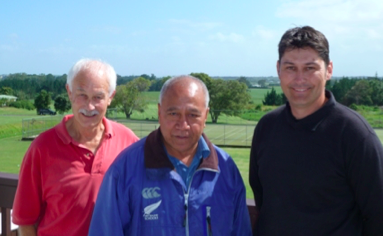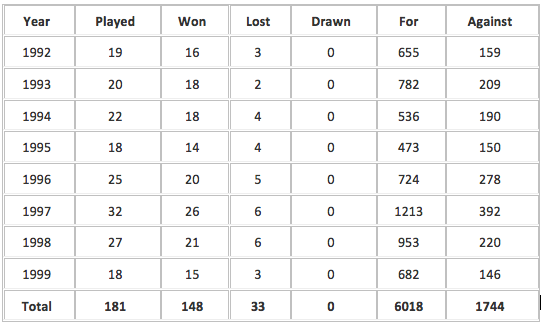 During the 1990's Wesley College was one of the best performed schools in the country. A winner of the National Top Four three times, Wesley was a school other's tried to avoid, such was their size, strength and skill. At the forefront of their many triumphs was a humble, pious and astute Tongan who has an innate skill to bring out the best in people. Amanaki Lelei Palavi: “The weakest link in the chain is also the strongest.” 1999 Collegian Magazine: “Praise to the Lord for we are only ordinary people who do extraordinary things to bring honour and glory to his name. Through faith, learning and hard work we find success within the 1st XV.” Reflections: Amanaki Lelei Palavi First Rugby Experiences: “I played for the only team at Tupou High School, in Tonga, starting as a hooker before switching to halfback. How was rugby in the Islands? Rough!” Arrival to New Zealand: “I arrived in 1976 and studied at Massey University in Wellington; I played a bit of social rugby, but was never good enough to go further. I admired the All Blacks a lot, they inspired me to stay involved socially and then to start coaching. It wasn’t so much the fact they won a lot, but the way they won. Bryan Williams, Ian Kirkpatrick and Lachlan Cameron were among my early favourites.” Coaching Debut: “I started in 1988 with the Dannevirke High School Under 15’s. We won the 3M Northern tournament, our best finish in previous tournaments had been 12th. In the semi final one of my players complained he had a ‘dead leg’, I didn’t know what that was so I told him to get over it. He ran so hard into Kelston’s best player he broke his collarbone! In the final we beat Whangarei Boys.” Arrival At Wesley: “I was first involved with the First XV in 1992. I started as an assistant coach. My first match was against St Stephen’s. We had lost to their 2nd XV, while their First’s had won 43 games in a row, they were so strong! We beat them, 11-10! It’s very sad what happened to St Stephen’s. The matches between us were epic struggles. Their coach at the time Charles Timutimu was somebody I really respected.” Coaching Influences: “I observed Chris Grinter a lot; he was so organised, firm and cool. I used to go along to the Counties coaches days they had. It was very helpful sharing ideas with other coaches.” 1993: “To win the national title took a full team effort. We had a very talented team and of course Jonah Lomu was a player who could win a match anytime, anywhere. However Jonah was just one member of the team. At the start of the season his attitude needed to improve. After one match, where he was injured, he took off before the after match function. I told him to apologise to the team, he refused so I threatened to drop him as captain, half an hour later he came back and apologised to me, I said go and apologise to the team. Jonah could talk as a leader but his actions were what really inspired. Bringing Out the Best In People: “I like the adage: the weakest link in the chain is also the strongest, everybody has a contribution to make. If you can get the team working together to cover the weakest link, that makes for a combined strength that is very hard to stop. I don’t understand coaches who swear at players after they make a mistake. That only makes the player feel more down. I try and encourage player input and sometimes I even listen to the supporters.” Relationship With The Captain: “A captain has to have the vision to see the whole game, keep calm under pressure and know what to say and how to say it. He has to have the ability to change the strategy when required. The coach’s job is to help the captain display those skills.” Faith: “The Christian faith plays a big part in my life. I pray for guidance everyday and believe what we have is God given. The prayer was always a big part of our pre and post match experience; it’s something that brings unity, purpose and humility to a team. If you don’t believe in God that’s fine, but I asked the players to respect what I believed to be a custom that brought strength to Wesley.” Tough Times In 1997: “I promoted Sio Puleanga, a first five in the second XV, to the firsts. In his first game against Rotorua Boys High School I played him on the wing and he dropped the ball with an open try line, we lost the game, 0-11. In our next game against Western Heights High School our kicker was injured. I told Siohe would be taking the kicks, he wasn’t confident, but nailed them from everywhere and we won, 20-11. In the Top Four Semi final against Rongotai College, a really dangerous side, we were down 5-11 at halftime. I was disappointed with our performance and told the team, ‘don’t tackle and show Rongotai the try line!’ I then walked off, and we won 31-11!” Hiding of Palmerston North In Top Four Final: “Our captain Koli Latailakepa was unavailable for the final. For religious reasons he didn’t play on Sunday. He was in tears beforehand because he obviously wanted to play. I said don’t worry God will replace you. We won the final 41-3! It rained during the game and our forwards were pushed around a bit, but our defence was outstanding and after a while things just clicked. I was always confident about the 97 team; they were a very talented and close-knit group. Seilala Mapusua in the 1997 First XV below! World Ten’s: “This was a tough event. We won the final against George Smith’s team, 30-0!” George Smith went on to play 110 tests for Australia and 122 games for the Brumbies; Wesley won all nine games at this event, outscoring their opponents 225-40. Biggest Change In the Game: “The emphasis on defence is bad. A lot of big games are won by the team who spoils the opposition’s ruck ball the most effectively, or the team that plays better field position, skill should be the deciding factor. I try to and encourage all of our players to be fully involved, get it to the wings and attack. A defensive approach restricts the involvement of the team and reduces the enjoyment of the spectators.” Major Milestones Counties Champions: 1992, 1994, 1995, 1996, 1997, 1998, 1999 National Top Four Winners: 1993, 1997 Counties Sevens Champions: 1992, 1993, 1994, 1996, 1997, 1998, 1999 Condor Sevens Champions: 1993, 1996 World Ten’s Champions: 1998 All Blacks: Jonah Lomu, Casey Laulala Manu Samoa Internationals: Kitiona Viliamu, George Stowers, Seilala Mapusua Tongan Internationals: Salesi Moimoi, Hale T-Pole The Palavi Era In Number |
Archives
October 2023
Categories |
OrganisationCollege Sport Media is dedicated to telling the story of successful young sportspeople in New Zealand
|


 RSS Feed
RSS Feed